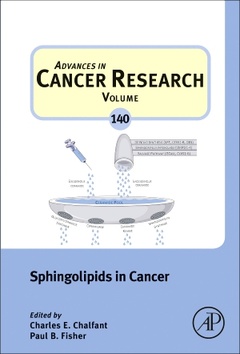Description
Sphingolipids in Cancer
Advances in Cancer Research Series
Director of collection: Tew Kenneth D
Language: English
Subjects for Sphingolipids in Cancer:
Keywords
Aapoptosis; ABC294640Ccancer; Apoptosis; Autophagic cell death; Autophagy; Cancer therapeutics; Cancer therapy; Cancer; Ccancer therapy; Ccancer; Cceramide; Cchemotherapy (drug) resistance; Cell migration; Ceramide 1-phosphate; Ceramide signaling; Ceramide; Ceramides; CERT; Deoxysphingolipid; Diacylglycerol; Endocytic trafficking; ER stress; ExosomesMmetastasis; Ganglioside; Gglucosylceramide synthase; Growth arrest; iDISC; Iinflammation; Inflammation; Leukemia; Liver fibrosis; hepatocellular carcinoma; Llipidomics; Lung cancer; Lysosome; Metabolism; Metastasis; miRNA; Mitophagy; Mmitophagy; Neuroblastoma; Neutral sphingomyelinase; Nnecroptosis; Nonalcoholic fatty liver disease; p53Transcriptional regulation; Pancreas cancer; Pprecision-medicine; Pprostate cancer; Senescence; Side effect; SMS1SMS2Sphingomyelin; Sphingolipid; Sphingolipids; Sphingomyelin synthase; Sphingomyelin; Sphingomyelinase; Sphingosine-1-phosphate; Ssphingolipids; Ssphingosine 1-phosphate; Ssphingosine kinase; Ssphingosine; Steatosis; Ttherapeutics; Tumor suppression
410 p. · 15x22.8 cm · Hardback
Description
/li>Contents
/li>Readership
/li>Biography
/li>Comment
/li>
Sphingolipids in Cancer, Volume 140, the latest release in the Advances in Cancer Research series, provides invaluable information on the exciting and fast-moving field of cancer research. Topics discussed in this updated volume include Mechanisms of ceramide-dependent cancer cell death, Sphingolipids as regulators of autophagy and endocytic trafficking, The role and function of sphingomyelin biosynthesis in the development of cancer, Neutral sphingomyelinases in cancer: Friend or foe?, Sphingolipid rendezvous at the crossroad of NAFLD and senescence, Ceramide signaling and p53 pathways, Sphingolipid regulation of RNA Biology in cancer phenotypes, The role of ceramide-1-phosphate in tumor cell survival and dissemination, and more.
1. Mechanisms of ceramide-dependent cancer cell deathRose Nganga, Natalia Oleinik and Besim Ogretmen 2. Sphingolipids as regulators of autophagy and endocytic traffickingMegan M. Young and Hong-Gang Wang3. Role and function of sphingomyelin biosynthesis in the development of cancerGiovanni D’Angelo, Sitapriya Moorthi and Chiara Luberto4. Neutral sphingomyelinases in cancer: friend or foe?Christopher J. Clarke5. Ceramide and exosomes: a novel target in cancer biology and therapyAhmed Elsherbini and Erhard Bieberich6. Sphingolipids at the crossroads of NAFLD and senescenceMariana Nikolova-Karakashian7. Ceramide signaling and p53 pathwaysKristen Jeffries and Natalia Krupenko8. The role of ceramide 1-phosphate in tumor cell survival and disseminationAntonio Gomez-Muñoz9. The onus of sphingolipid enzymes in cancer drug resistanceSamy A.F. Morad and Myles C. Cabot10. Interdiction of sphingolipid metabolism revisited: focus on prostate cancerChristina Voelkel-Johnson, James S. Norris and Shai White-Gilbertson11. Targeting sphingosine kinases for the treatment of cancerClayton S. Lewis, Christina Voelkel-Johnson and Charles D. Smith12. Novel sphingolipid-based cancer therapeutics in the personalized medicine eraJeremy Shaw, Pedro Costa-Pinheiro, Logan Patterson, Kelly Drews, Sarah Spiegel and Mark Kester13. Side effects in cancer therapy: are sphingolipids to blame?Falak Patel and Stefka D. Spassieva
Researchers and students in the basic and clinical sciences of cancer biology and oncology, plus related areas in genetics, immunology, pharmacology, cell biology, and molecular biology.
The Tew laboratory maintains an interest in using redox pathways as a platform to develop therapeutic strategies through drug discovery/development and biomarker identification. We interrogate how reactive oxygen and nitrogen species (ROS/RNS) impact cancer cells and develop novel drugs that impact on glutathione based pathways. Our research efforts have been integral to studies that have identified glutathione S-transferases (GST) as important in drug resistance, catalytic detoxification and as arbiters of kinase-mediated cell signaling events. In addition, we have been instrumental in defining how GSTP contributes to the process by which cells respond to ROS by selective addition of glutathione to specific protein clusters, so called S-glutathionylation. Each of these research areas has had broad impact on a number of cancer disciplines. Moreover, we have also been seminally involved in the Phase I to III clinical testing of three oncology drugs, Telcyta, Telintra and NOV-002. Other ongoing translational efforts have produced two ongoing clinical trials to measure the effectiveness of serum S-glutathionylated serine proteinase inhibitors as possible biomarkers for exposure to hydrogen peroxide mouthwashes and radiation.
- Provides information on cancer research, with this release focusing on sphingolipids
- Offers outstanding and original reviews on a range of cancer research topics
- Serves as an indispensable reference for researchers and students alike
These books may interest you

Sphingolipids in Disease 316.49 €



